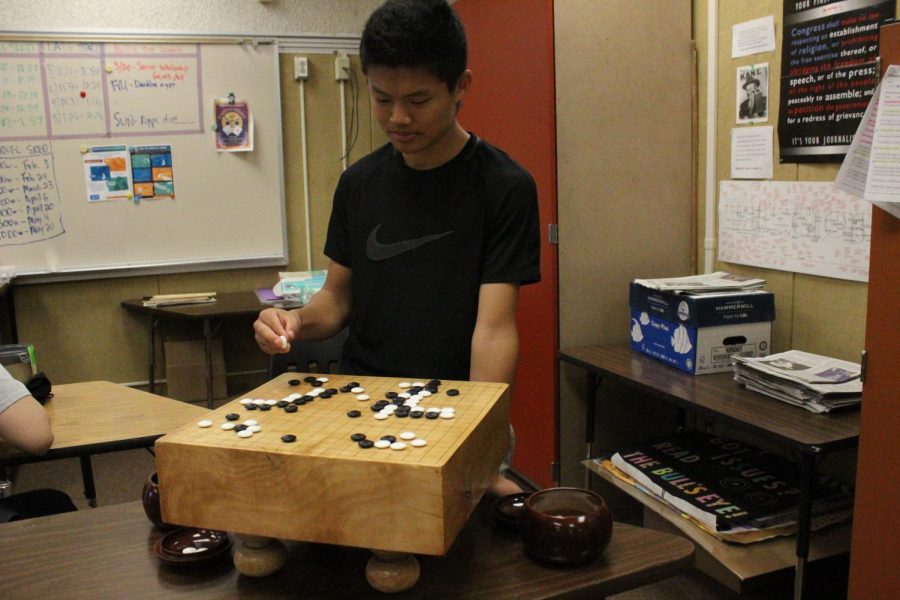Sophomore finds comfort in the Chinese board game Go
When most people think about board games, classics such as Monopoly, chess or Scrabble usually come to mind. However, for sophomore Nathan Han, the only one on his mind is Go—a board game of strategy that originated in China over two thousand years ago.
The main goal of the Go is to surround as much of the game board space as possible with your game pieces. There are two players, black and white game pieces known as counters, and a 19×19 grid board with 361 intersections, where a counter can be placed. The game ends once both players cannot claim more territory or move a counter without invading their own territory. Each player receives a score at the end of the game, based on how much territory they surrounded and how many counters they captured.
Han has been playing Go for two and a half years; however, he has only played competitively for about a year. His grandparents pushed Han’s father to teach him the game two and a half years ago, but it was actually a manga titled “Karneval” that pushed him to begin playing for fun and start competing. Han was inspired by the characters who played Go in the manga.
Han is coached in Go a couple of times a week over Skype since his teacher has been in Korea for the past three months. He has competed in competitions such as the annual U.S. Open Competition held by the U.S. Go Congress in Wisconsin this past year. He also participated in the annual Coffee Cup that takes place in Santa Monica and the Cotsen Open Tournament held in Los Angeles. A couple of Han’s proudest achievements are winning all five of his games at the Cotsen tournament and winning third place in his division in the U.S. Open.
“The U.S. Open is amazing because there are so many people from all over the world that come and I made some friends from the east coast, Colorado and Iowa,” Han said. “It was actually a really eye-opening experience.”
Han said that Go provides him with a way to get away from normal life when he is playing. Despite the game requiring strategy and plenty of thinking over the possibilities that come with each turn, Han finds that it makes him feel calm and gives him a sense of serenity. Another aspect of Go that Han enjoys is being able to meet new people through the competitions.
“It’s weird but [Go] gives me a certain peace and then there’s also a competition aspect that’s really fun too, and I’ve met a lot of really cool people that play from ranges of six to 90 years old,” Han said.
What sets Go apart from other board games, according to Han, is that there is no way to play a perfect game, unlike games such as chess. In Go, there are a myriad of different moves that can be made with each turn, and the player has to predict the outcome of each possible move they might make.
“There’s no right move usually, in Go there are at least five different ways you could play and five different moves you can do which makes it really complicated,” Han said. “You have to think about every single thing and what your opponent is going to do; there’s a concept called reading and professionals can read up to 50 moves ahead.”
Strategy is a large factor that comes to play during Go, but Han said that he usually takes a riskier route, involving very aggressive moves against his opponent. When it comes to reading moves, Han said that he can read up to seven at most, but usually around five. During a game, Han thinks back to professional games he’s watched and tries to imitate some of their moves when he can.
“Usually you want to be the aggressor first because then it’s easier to play with your opponent instead of being played by your opponent, and sometimes it pays off but sometimes I lose horribly,” Han said.
Han plans to continue playing Go and will attend more competitions, especially the next U.S. Open.
Your donation will support the student journalists of Diamond Bar High School. Your contribution will allow us to purchase equipment and cover our annual website hosting costs.



